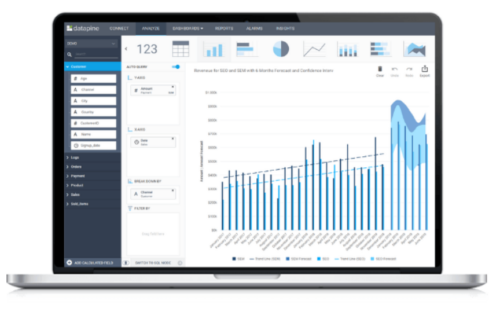Business analytics software has become an indispensable tool in the modern business landscape, offering insights and data-driven strategies that empower organizations to make informed decisions.
In this article, we will explore the significance of business analytics, delve into key features of effective analytics software, and provide a comprehensive guide on choosing, implementing, and optimizing its use.
Introduction to Business Analytics Software
In a data-centric world, businesses need more than just raw information; they require actionable insights. Business analytics software serves as the bridge between data and decision-making, allowing organizations to analyze trends, identify opportunities, and mitigate risks.
Importance of Business Analytics in Today’s World
In an ever-evolving market, businesses face unprecedented challenges. Here, we discuss how business analytics software plays a pivotal role in navigating this complex landscape, offering a strategic advantage in a data-driven economy.
Key Features of Effective Business Analytics Software
– Data Visualization
One of the essential features of business analytics software is its ability to translate complex data into visually appealing and understandable formats. This aids in better interpretation and communication of critical insights.
– Predictive Analytics
Predictive analytics enables businesses to forecast future trends and outcomes, empowering them to proactively address challenges and seize opportunities before they arise.
– Real-time Reporting
The real-time reporting feature ensures that decision-makers have access to the most recent data, fostering agility and responsiveness in a fast-paced business environment.
How Businesses Benefit from Using Analytics Software
– Improved Decision-Making
By leveraging analytics software, businesses can make data-driven decisions, minimizing the reliance on intuition and guesswork. This section explores how informed decision-making can positively impact overall business strategies.
– Enhanced Operational Efficiency
Business analytics optimizes processes, streamlining operations for increased efficiency. We delve into real-world examples of organizations that have witnessed significant improvements in their day-to-day operations.
– Competitive Advantage
Gaining a competitive edge is crucial in today’s cutthroat business environment. Learn how analytics software provides insights that can set businesses apart from their competitors.
Choosing the Right Business Analytics Software
– Scalability
An exploration of why scalability is a crucial factor in selecting the right analytics software, especially for businesses with evolving needs.
– User-Friendly Interface
The importance of a user-friendly interface in ensuring that employees across various departments can easily navigate and harness the power of analytics tools.
– Integration Capabilities
How seamlessly the analytics software integrates with existing systems and applications can significantly impact its effectiveness. This section offers insights into choosing software with robust integration capabilities.
Common Challenges in Implementing Business Analytics Software
– Data Security Concerns
Security is a paramount concern when dealing with sensitive business data. We discuss common security challenges and strategies to mitigate risks associated with analytics implementation.
– Resistance to Change
Human nature often resists change. This section explores how organizations can overcome resistance during the adoption phase and ensure a smooth transition to analytics-driven decision-making.
Case Studies: Successful Implementation of Business Analytics
– Company A: Transforming Sales Strategies
Explore how Company A utilized analytics software to revolutionize its sales approach, resulting in increased revenue and customer satisfaction.
– Company B: Optimizing Supply Chain Management
A detailed analysis of how Company B leveraged business analytics to enhance its supply chain management, achieving cost savings and improved logistics.
Future Trends in Business Analytics Software
– Artificial Intelligence Integration
The future of business analytics lies in the integration of artificial intelligence. Discover how AI is reshaping the landscape of analytics software.
– Advanced Data Analytics Techniques
As technology advances, so do analytics techniques. This section explores cutting-edge data analytics methods that are shaping the future of business intelligence.
– How Small Businesses Can Leverage Business Analytics
Contrary to common misconceptions, business analytics is not exclusive to large enterprises. Small businesses can also harness its power for strategic growth. This section provides practical tips for small business owners.
– The Role of Cloud-Based Business Analytics Solutions
Explore the advantages of cloud-based analytics solutions, including flexibility, scalability, and cost-effectiveness.
– ROI of Investing in Business Analytics Software
An in-depth analysis of the return on investment businesses can expect from their analytics software, highlighting both tangible and intangible benefits.
– Top Business Analytics Software in the Market
A curated list of leading analytics software, comparing features, functionalities, and user reviews to help businesses make informed choices.
– User Tips for Maximizing the Benefits of Analytics Software
Practical tips for users to maximize the benefits of analytics software, ensuring that organizations extract the most value from their investment.
– The Evolving Landscape of Business Intelligence
As business analytics evolves, so does the broader field of business intelligence. This section discusses the dynamic nature of BI and its implications for the future.
FAQs
What sets business analytics software apart from traditional reporting tools?
Business analytics software goes beyond reporting by offering advanced features like predictive analytics and real-time reporting, providing a deeper understanding of data.
How can small businesses afford business analytics software?
Many analytics solutions offer scalable pricing, making them accessible to small businesses. Additionally, some open-source options provide cost-effective alternatives.
What challenges do businesses commonly face when implementing analytics software?
Common challenges include data security concerns, resistance to change, and the need for proper training. Overcoming these hurdles is crucial for successful implementation.
Is artificial intelligence a necessary component of modern analytics software?
While not mandatory, AI integration enhances the capabilities of analytics software, offering more advanced insights and predictions.
Can businesses switch from one analytics software to another easily?
The ease of switching depends on factors like data migration and system compatibility. Planning and execution are vital for a smooth transition.
Conclusion: Embracing the Power of Business Analytics
In conclusion, we emphasize the transformative impact of business analytics software on modern enterprises. It is not merely a tool but a strategic ally in navigating the complexities of the business world.
